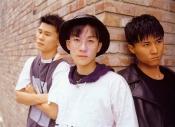 From http://en.wikipedia.org/wiki/Seo_Taiji
From http://en.wikipedia.org/wiki/Seo_Taiji
Seo Tai-ji (also spelled Seo Tae-ji, born Jeong Hyeon-cheol on February 21, 1972) is a South Korean singer and musician. As a cultural comparison, Tai-ji's levels of popularity in Korea is analogous to the popularity of Michael Jackson in the mid-1980s.
Biography
The early years
At the age of 14, Jung Hyun-Chul (Tai-ji) participated in several amateur rock bands. In 1990, at the age of 17, he was recruited into the underground metal group Sinawe (pronounced shee-nah-wee). Taiji chose to drop out of school, a system that he felt did nothing but corrupt the minds of youth, and became a professional musician.
[edit]
Seo Tai-ji and Boys Explode
After the break up of Sinawe in 1991, Tai-ji switched gears and formed the dance group Seo Tai-ji and Boys (서태지와 아이들) with dancers Lee Ju-no and Yang Hyeon-seok.
The introduction of the first Seo Tai-ji and Boys album announced a complete shift in the focus of popular Korean music that is still felt today. Their first single, "Nan Arayo" (난 알아요, "I Know") was a hugely successful hit, being one of the first songs in K-Pop to meld contemporary dance sounds with urban-influenced rap lyrics.
The sound of Seo Tai-ji and Boys' albums was constantly evolving. The first album was very dancey, while the second album began to introduce more hard rock and heavy metal influences, but still remaining mostly a dance album. The first single from their second album, "Hayeoga" (하여가), combined heavy metal sounds with traditional sounds of the taepyeongso, a traditional Korean wind instrument.
Watch Out video, Left to right: Rock (offscreen), Sang Uk, Heff (background), Seo Taiji, Top
The third album switched gears to being much more heavy metal and rock driven. The danceable tunes are nearly non-existent. Instead, songs such as the extremely controversial Gyosil Idea 교실 이데아, Classroom Idea) took center stage. Gyosil Idea was extremely critical of the Korean education system and its brainwashing of the youth of Korea. Accusations began to fly about Seo Tai-ji and Boys. They were accused of backwards masking Satanist messages in their songs.
Not backing down, Seo Tai-ji and Boys' fourth album exploded with more controversial songs. Come Back Home was a foray into Korean gangster rap. Shidaeyugam (시대유감, "Regret of the Times") was nearly banned by the Korean Broadcasting Ethics Committee as having lyrics that were considered not appropriate to the young listeners.
Seo Tai-ji and Boys broke up in 1996 after four wildly successful studio and two hugely popular live albums. Tai-ji disappeared from the music scene for the next two years, moving to New York City, living a low profile life, and working on his come-back.
In 1998, Tai-ji returned to the music scene with his first solo album, Seo Tai-ji. His self-produced album continued with his long established sound of mixing contemporary American rock and pop music with Korean vocals. His comeback album, while not a huge success, put him back onto the path of greatness.
In 2000, Tai-ji exploded with his hugely popular sixth album, Ultramania. With his new band, he blasts out an album with hardcore, crashing metal tracks. "Ultramania," "Internet War," and "Tank" were all huge successes. With the release of his new album, Tai-ji embarked on his first Korean tour since 1996 playing to sold out crowds.
Ultramania was re-released in 2002 with remastered tracks and featured live Tai-ji tracks from the 2002 ETPFEST.
In early 2004, after almost four years, Tai-ji's first all new album, 7th Issue, was released.
Although Taiji's career is strictly "solo", these people consistently play with him during tours, studio recordings, and music videos:
* Top (guitar)
* Rock (guitar)
* Sang Uk (Monkey) (bass)
* Heff "The Machine" Holter (drums)
Discography
Albums (Seo Tai-ji and Boys)
Albums (Solo)
* Seo tai ji (1998)
* 울트라맨이야 (2000)
* 태지의 話 [Live concert album] (2000)
* 6th Album Re-Recording and ETPFEST Live (2003)
* Seo Taiji 7th Issue (2004)
* Seo Tai Ji Live Tour ZERO 04 (2004)
Singles
* Feel The Soul (2001)
Videos
* 2004 SEO TAIJI Record of the 7th (2005)
* The Shedding Bird: Seo Taiji Company DVD+Art book (2005)
* Seo Taiji Live Tour ZERO 04 DVD+Art book (2004)
Live Releases
* 태지의 話 [Live concert album] (2000)
* Seo Taiji Live Tour ZERO 04 (2004)